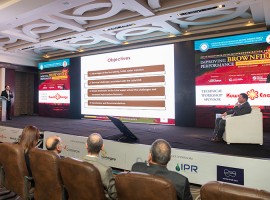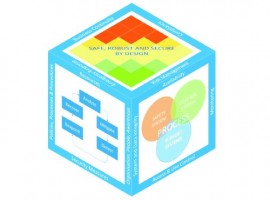By Nataša Kubíková
At the time ENG. SALEM HASSAN ABDALLAH joined Suez Oil Company (SUCO) as its Chairman, the oil prices witnessed a major downfall, which “has become a serious problem for all the companies,” as he said in an exclusive interview with Egypt Oil&Gas.
It is no surprise that the global oil price environment hit the Egyptian oil and gas companies harshly and limited the scope of their operations. “All activities are reduced to the minimum and SUCO’s budget in the GOS decreased by 10%,” noted the chairman. This was visible especially in the operations related to the oil. Although the payments and investments in the gas exploration and production remain less affected, the pay-outs are still lower than before, according to Eng. Hassan.
SUCO, the company that has formed a joint venture entity with German RWE Dea, was no different to other players in the industry when the news hit the shore. “We have stopped the drilling, and until now we have not built a new oil rig,” the chairman explained. Currently, SUCO is operating merely workover oil rigs with an average production cost of $22 per barrel. In oil production from the company’s mature fields, the chairman said, “SUCO is applying gas lift, water injection, and EOR technology” to boost the output, however, the drop in oil prices prevented several projects from being completed. Nonetheless, the company hopes to renew some of its recently terminated contracts, which “may result in launching new drilling rigs,” as Eng. Hassan added.
The situation for SUCO is slightly different when it comes to the gas. Its chairman said that currently “the only rig we have [drilled] is for the gas, not for the oil.” In addition, the company called for a tender for its gas reserves and “plans to drill a new gas well in June,” as Eng. Hassan stressed. Drilling a second well is optional and depends on several financial and market factors.
In the current unfavorable environment, SUCO is determined to face difficulties with grace. “We are planning to meet the challenge of low oil prices by introducing cost savings and cost reduction,” he noted. Yes, “our vision is to always use all our resources and potential to achieve our target economically, safely, and environmentally,” and to achieve “responsible growth for the benefits of all employees, social [actors], and shareholders,” Eng. Hassan added.
Success of the Disouq Gas Project
In the area of gas exploration and production, “the major achievement of SUCO in the last year is the Disouq Gas Project, currently producing 120 mscf/d,” as the chairman said. “Our current production is further boosted with 50 mscf/d of gas produced from the Zeit Bayt field,” revealed Eng. Hassan. He further described the details of the company’s plans in the sector in the future.
SUCO is following its vision to complete the Phases B in the Disouq gas field. The company will lay new pipelines as a frontline to collect the produced gas from the fields. The first three wells of the field will then be connected to the pipeline grid by February 2016, with other two wells scheduled to be added in April 2017. Phase B of the Disouq project is scheduled to be completed by June 2017 with the last four wells coming online.”The wells will not be connected at the same time because of a decline in production,” he added, and “the total production from these wells will be about 100 mcf/d, as Eng. Hassan estimated.
In addition, the Disouq Central Treatment Plant (CTP), built in 2014, is currently “enough to handle our production side by side with rental processing facilities, although we started studying [the processes of] upgrading CTP in order to boost company’s production capacity to 200 mcf/d, up from the current production of 120 mcf/d,” according to the company’s chairman. Even before that, SUCO plans to gradually increase its production from the Disouq field already by the end of this year with a projected “rise to the level of 150 mcf/d of gas.”
As Eng. Hassan further noted, in terms of the gas projects, “we are still in the beginnings and our production will increase by the end of 2016 when we connect two wells to production.”
Projecting New Opportunities
With ongoing production and existing facilities in the low oil price environment, “our situation is better than that of other companies,” said Eng. Hassan, because “in SUCO we have a lot of opportunities.”
According to the company’s Head, “we have more than 20 wells waiting for a workover, from which we can gain 6,000 barrels of oil,” however, investors are not willing to invest and instead they are waiting for prices to improve before these operations are realized.
This wait-and-see strategy shrinks possibilities to enhance SUCO’s potential, it seems, as the company has many in-field wells and appraisal wells that are halted. Based on studies conducted by SUCO, “the remaining reserves in SUCO’s fields are at the level of 54 million barrels of recoverable oil,” emphasized the chairman, and “additional 50 million barrels of oil can be expected to be added to the overall output “
While the rationale behind decreased levels of operations is expected, there are some that may argue for further drilling investments even in the currently unfavorable price climate.
SUCO’s Chairman argued from a comparative angle saying that according to standard operational calculations, “costs for drilling a well is between $1.5m to $3m with the production output of around 600 barrels or 1,000 barrels.” This financial estimate suggests higher expenses and lower output. However, the case of SUCO is different. SUCO’s fields may promise more. Eng. Hassan has calculated that investing “up to $1m in production activities [in company’s fields] will contribute to extracting additional 3,000 barrels of oil a month,” which will necessarily boost today’s rates at relatively bearable costs.
The proposition, which SUCO has at its disposal, can work to the benefit of the JV if it was not for a lack of finances. “The funding is the only difficulty. The problem is the operating costs, not one of a technical character,” said Eng. Hassan. As he further clarified, “these opportunities are coming from workover rigs.” There seems to be a lack of evidence to support the currently adopted option, even in the given oil price context, which makes the company “wait for rigorous operations [to be undertaken] without a risk.” Eng. Hassan thus made a case that instead a reversed strategy of opening up operations anew may come at hand despite involved risks.
Nevertheless, the issue of financing reaches further, beyond the framework of operations and performance conducted in a JV structure, and relates to the survival strategy of each and every Egyptian company. “If a [foreign] partner leaves, the [Egyptian] company needs to have the minimum operating costs budget [available to be able] to continue its operations. The same logic may apply if an international partner in a JV opts for a paused tactic in its investments in operations.
Alternative Forms of Activities
In the context of halted activities, companies may ponder many other ways out of this restrained situation. As the scope of operations is often dependent on investors’ decision to conduct further exploration and drill new wells, the Egyptian companies may search for other activities instead.
As Eng. Hassan explained, “we have 1,800 employees in our fields, which is a high number, the only way for us is to open other activities with other companies to use employees’ experience in new projects,” he argued citing an example of companies that for instance pushed their operations abroad such as EMC. Another solution may be the example of another company, CORC, that internally allowed its employees to work for another one as service providers” to get a temporary benefit from people’s qualifications, according to Eng. Hassan.
As for SUCO, its Head plans to apply these processes “internally through some experts who can train the employees.”
Mutual Cooperation Approach
Under the burden of present challenges, mutual cooperation can open previously unthinkable room for enthusiasm. As SUCO Chairman put it, the companies should “sit together to try to find solutions and exchange experience related to these [financial and operational] problems.”
One way to achieve this is through an action plan that would encourage companies “to open their available activities and operations to other players,” he added. For instance, as he further elaborated,” some companies can “offer their training centers to others in the market in order to expand the already existing potential and capacities” within the Egyptian oil and gas companies.
This mode of cooperation would be a significant game-changer for the sector, and Eng. Hassan has already become a pioneer in this respect. He has adopted a collaborative strategy fully, as he said: “I am working for the sector, not for a certain company.” “When I know that one of our companies needs one of our people, and it will not affect us in SUCO, that person can go to another company to help out. If we send him to another company, we cover his job by other employees,” openly shared the chairman, stressing that he is willing to do so, because “the other company is like my company.” This shift of focus from individual companies to the interest of the entire sector advocates for joint actions in favor of long lasting achievements.
Similarly, this collaborative approach may be further beneficial in the area of material support. As SUCO transfers its equipment from Cairo to its other fields and platforms, the arrangement can be made with other companies as well. The chairman said that such “coordination can be made with different companies [in order] to help each other in transporting the equipments,” that may further lift a part of the burden that the sector is currently facing.
A collaborative approach that Eng. Hassan promotes is based on a rationale that when one company suffers difficulties, the entire sector will be affected. Therefore, his proposition to find alternative ways to coordinate among companies bears the importance and promises success.
Currently, this way of collaboration is already in place in the area of human resources. “If a JV partner leaves the business, we [as the sector] have laborers that are redistributed,” he added. SUCO is no exception to this practice scheme, and its chairman praises advantages of this arrangement for the entire sector.
Therefore, in a short term, this pro-active approach to mutual cooperation among companies in the sector may help to navigate all firms more easily through the current low oil price crisis. In a long run, it may help withstand the challenges, and more importantly preserve the professional capital within the domestic structures, as well as develop it further.
Therefore, Eng. Hassan is rather positive about the prospects. He has 31years of technical and management experience in the sector, previously working as a Field Manager at Petrobel in offshore and onshore fields and as the Former Chairman of Petrozeit. This allows him to strategize through the climate and point out many new opportunities that were not yet fully explored in the industry.








